#the moriarty plan is met with so many interesting similar plans throughout the series
Explore tagged Tumblr posts
Text
Trafalgar Square, Bloody Sunday, Rebellion, Moriarty the Patriot, and The Phantom of Whitechapel
Ok. I think I have finally figured out Bloody Sunday. The wikipedia article is honestly kind of atrocious. I want to update it to be honest. Maybe I'll try when I get done with this 🤷♂️
(Long post, etc)
Part 1: Historical Context & Sources
The good source is JSTOR (not the one by Theresa Moriarty, that ended up only really mentioning Bloody Sunday in passing as it related to someone's biography, although I will add it to the list.) Here... have MLA I don't care, you probably really want the link.
Andy Love. “Centenary of Bloody Sunday.” History Workshop, no. 26, 1988, pp. 211–12. JSTOR, http://www.jstor.org/stable/4288877. Accessed 12 Mar. 2023.
If you don't have access to JSTOR this website says similar things, and also claims to cite primary sources. I'm not familiar with the domain though, so take that as you will: https://spartacus-educational.com/TUbloody.htm
Moriarty, Theresa. “Labour Lives, No. 13: May (Abraham) Tennant, 1869-1946.” Saothar, vol. 36, 2011, pp. 99–101. JSTOR, http://www.jstor.org/stable/23200051. Accessed 12 Mar. 2023.
Alright, that out of the way, basically, Bloody Sunday and Trafalgar Square refer to a mass protest by laborers that was met with (brutal) police and military suppression, resulting in continued protests. A group of aligned labor groups had chosen the square, symbolic of the meeting of London's East and West Ends, as a place to protest poor working conditions and low wages.
In addition to the Socialist Democratic Federation, which is discussed at length in (2), the following organizations were present/organizing the attendees at the square: The Socialist League and the unemployed, the Trade Union, and "radical groups." (1) A march was planned, where speakers would address the crowd, and they would make demands. The crowd instead was met by both the military and the police, who fought back brutally, at least according to one of the leaders of the movement, Williams Morris.
Following the events in the square, another prominent leader of the labor rights movement that hadn't been present at the march was run down and killed, sparking further protest over his funeral.
Finally, I want to quote this paragraph from (3) about Bloody Sunday, tying the Jack the Ripper murders to a larger sociopolitical labor rights movement:
"Police brutality in Trafalgar Square in November 1887 brought out thousands to the funeral parades that followed, and embedded 'Bloody Sunday' into the language of public political protest. In the summer of 1888, young Bryant & May women match workers in east London brought their defiant solidarity against their low pay and their hazardous work to the pavements of Westminster. By autumn Whitechapel women walked their neighborhood in fear and public fascination, when 'Jack the Ripper' exposed the lives of their sisters in poverty. London's political culture was being transformed through social concern and sensation..." (3)
Essentially, because of the Jack the Ripper killings, prostitutes now had a reason to join with other women laborers in solidarity-- or at least their concerns have academically been connected; I'm definitely not an expert and I feel like I've done more than enough academic research for someone who is months away from having graduated college 10 years ago and works in fucking retail.
Hopefully that's enough context.
Now, how does this inform my reading of The Phantom of Whitechapel and Moriarty the Patriot?
Part 2: Moriarty the Patriot's Plot
So, remember, in Moriarty the Patriot, the Jack the Ripper killings were being done by organized criminals to spur on a revolution. They want the proletariat to rise up and they aren't afraid to use people they view as inhuman to trigger it.
William sees this right away. After all, other than the fact that he (mostly) doesn't use the underprivileged as bait and pawns, he's doing the same thing. The sensational murders are just somebody else's play.
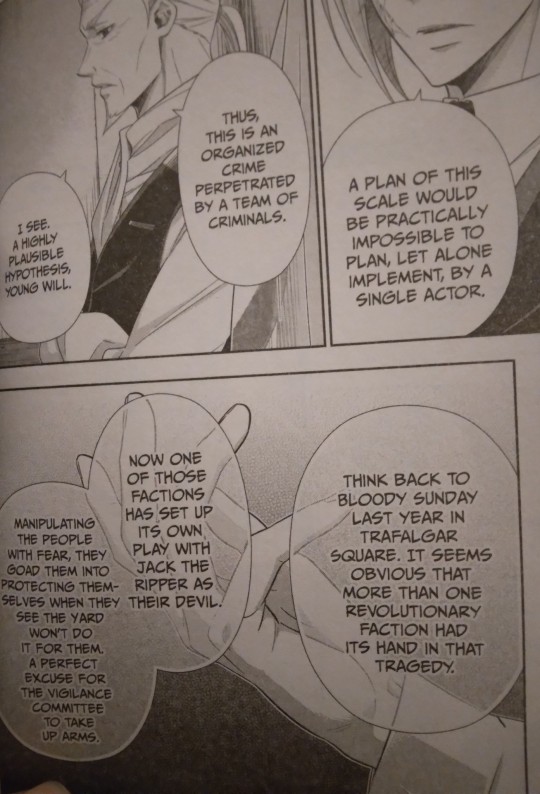
But, what's truly interesting is the bottom panel, where William brings up something that the Yard had been concerned about earlier:
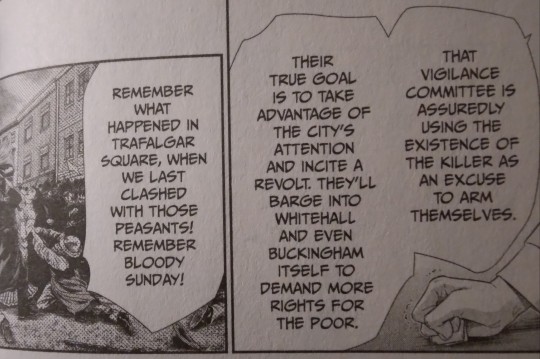
The Yard might think the Vigilance Committee is the mastermind, instead of this unnamed criminal force, but regardless, William and the Yard are indeed thinking along the same lines. The clash between poor citizens and the police is bringing back memories of another recent clash. It's happening again.
Clearly, the Yard doesn't want to deal with armed rebellion. Their job is to stop it. And the politicians of the time (real life too...(1) and (2)) are exactly with the Yard. They don't want to make concessions or make leeway for commoners, they don't care if conditions improve, and they don't care if they prevent the right to protest in the meanwhile.
Lestrade is right about there being forces above the Yard breathing down the commissioner's neck.
But William... what he's looking at is the way the agitation is taking place. The murders are public, with letters to the press, etc, to create hysteria, and to create the conditions where the people of Whitechapel are confronted with the fact that the people in power are not caring for them. The Yard doesn't care how many prostitutes die. How many citizens in Whitechapel die. They've specifically made disarming the Vigilance Committee their goal.
That's true regardless, and by killing people that are powerless, it becomes exceptionally clear to the populace. They will rise up against the police that fight them instead of protecting them. The revolution will happen.
I want to claim that this cell of agitators is acting disingenuously, but it's only apparent from the text that they don't value all people evenly.
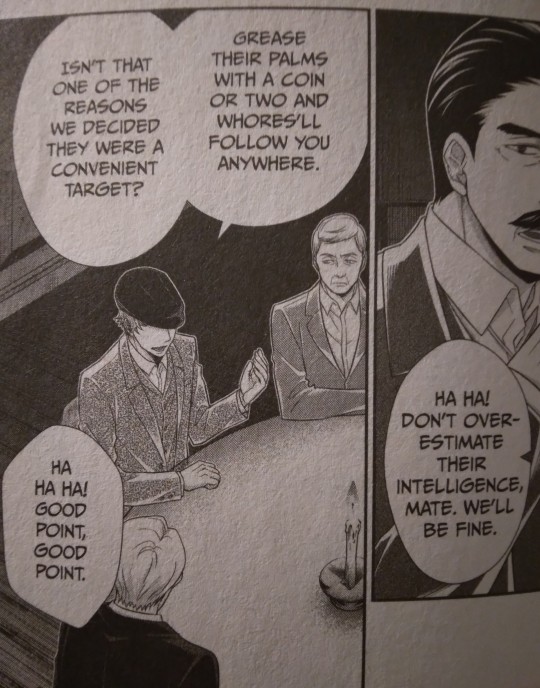
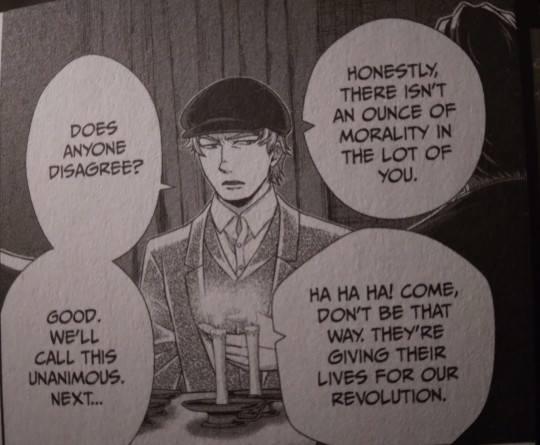
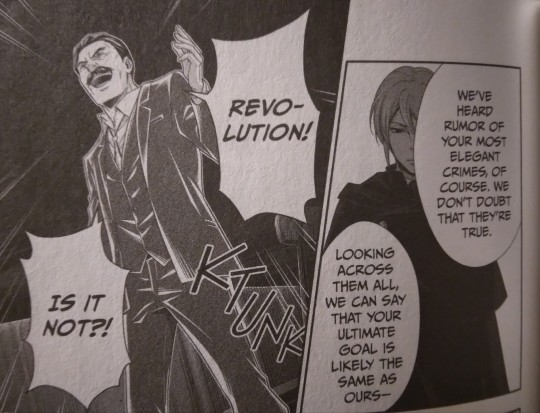
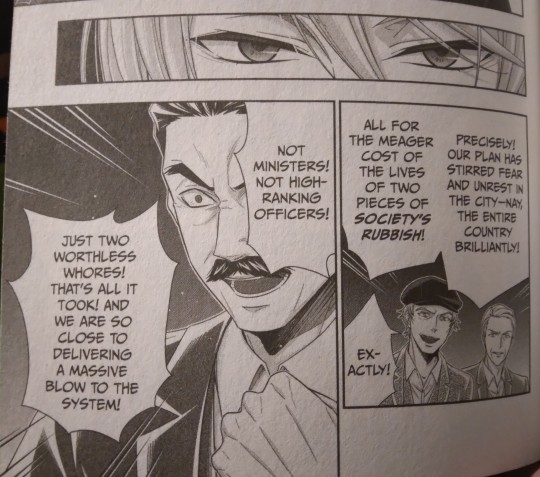
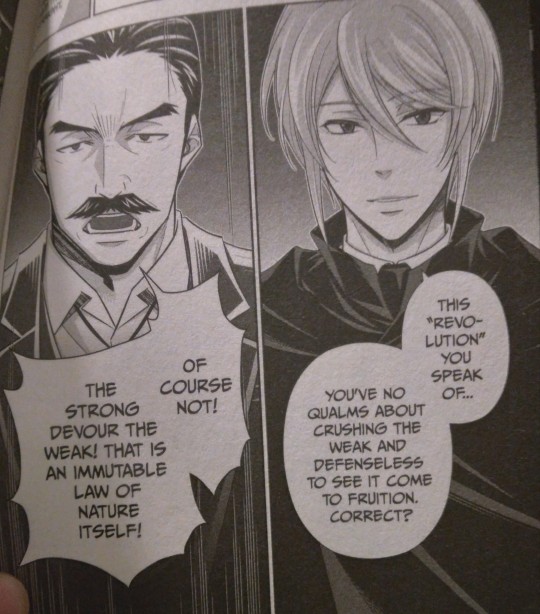
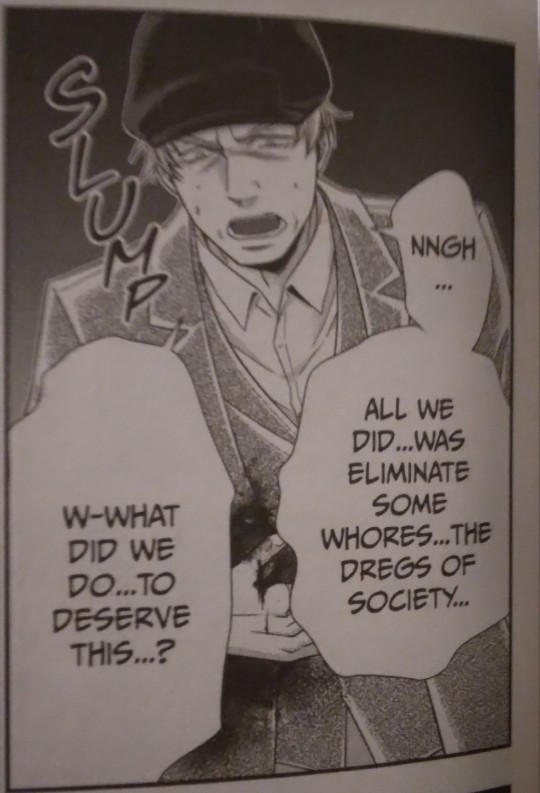
Whatever reason it is they seek proletariat revolution, it's clear they are not ideologically Marxists.
"Dregs of society" "All we did was eliminate some whores." "Society's rubbish." "With coin they'll follow you anywhere." "Worthless." "Meager."
How can anyone leading a proletariat revolution say or believe these things?
"The strong devour the weak" is Machiavellian, not Marxist.
To make it even more personal, William and Louis grew up in Whitechapel. The abandoned library has been taken down, but it was fucking RIGHT HERE.
This group must be culled.
Part 3: My Conclusions
Personally, I read that these men are trying to stir up revolution as a way to gain power. Right now they don't have a lot, and if they control when and how a revolution happens, they can come out on top in the end.
it's clear that they aren't interested in actually changing the status quo, with the strong on top and the weak on bottom. They also aren't actually interested in people's fates.
What does that mean for the plotline and what is being said about Bloody Sunday?
So, obviously this isn't in alignment to the Moriarty Plan, because outside of the one man that Lord Enders murdered and ended up being the centerfold of the act on the Noahtic, we don't really see William using anyone who hasn't already pledged their life to his ideals (and he even tries to respect the dead bodies he uses to the best of his ability). We get a strong stance against it, while having a more "pure" movement being put forward by William et al.
The differences I see are namely: a) consent: most people dying for William's plan have chosen to give their lives to the cause b) respect: William views all people as people and c) punching up instead of down: the people who don't consent to dying for William's plan deserved it. They weren't just stupid, or worthless, or the dredges of society. They were committing crimes against humanity and getting away with it.
But... if these people did do this, and it did incite revolution, and William hadn't stopped it... would it be so bad?
William wouldn't join hands with them. But in a thought experiment where he did, or he didn't exist, what would happen?
A story on NPR recently was talking about how to predict when a populist uprising will happen, and how to tell how successful it will be. This kind of cell, the kind of cell that will gain power from the revolt, the kind of politicians that are the voices of protest, regardless of how corrupt they are... the positioning of these people is basically the strongest predictor of a revolt's success.
So sure, these guys are assholes. But they probably would have succeeded. They would have used the few to create revolution, just as Moriarty does.
To what extent would our world care about the methodology used? To what extent do those differences make a difference? Are the few still not sacrificed for the many? Are the remaining people not better off in the end?
The most informative article about Bloody Sunday was a commemoration of the centennial of the protest. Nothing in the sources I found looked back poorly upon the agitators fighting for labor rights at the time.
I don't think that would change even if these events actually had happened.
And, since William plans to die at the end, take his whole cell with him... what is to say that that someone like this group couldn't still take advantage of his plan to gain power?
Sure, these guys are dead now. But surely they aren't the only ones?
#long post#moriarty the patriot#i have more questions than answers#the moriarty plan is met with so many interesting similar plans throughout the series#also... its interesting because while the manga is ostensibly about class struggle these guys aren't seen as patriots#ever#not like the conservative guy who resists the war in Afghanistan ending because he sees it as a way to maintain Brittain's colonial might#whose only crime was 'not wiling to die for the cause'#EVEN THOUGH HE FUCKING SACRIFICED SOLDIERS. MORAN'S FRIENDS#i have to see how the yard politics play out later#im exhausted#its 1:30am#but yeah... the actual real life events of Bloody Sunday definitely really lean into the themes of the manga and add a lot to think about
11 notes
·
View notes
Text
Holmes and Watson (2018)
Prior to 2018, the last decade showed two iterations of Sir Arthur Conan Doyle’s iconic Sherlock Holmes. The first pair: Two feature length movies, starring Robert Downey Junior (The Shaggy Dog, 2006) and Jude Law (Sky Captain and the World of Tomorrow, 2004) in original period pieces with new mysteries for the eccentric duo to encounter.
The second iteration was the BBC serial Sherlock starring Benedict Cumberbatch (Zoolander 2, 2016) and Martin Freeman (Swinging with the Finkels, 2011) in a contemporary reimagining of the detectives, set in modern-day Great Britain.
Both imaginings of the iconic Sherlock Holmes were met with varying levels of approval, as they separately boasted elements, both borrowed and original, to enhance and continue the spirit of Doyle’s series.
Yet, neither was perfect.
The 2008/2011 films left little to the imagination.
The immigration away from text and onto the silver screen left behind traditional elements favoured by detective stories. The translation left the audience struggling to keep up in both iterations, as the clues left behind were either completely irrelevant or far beyond the perceptive capabilities of even the brightest minds.
Thus, they have developed a distinct “style” - similar to The Matrix’s bullet time sequence - where the world slows down and the audience is graced with the mind of Holmes, as he meticulously analyses his surroundings for clues or a way out of a sticky situation. Admittedly, the scenes are well composited and entertaining, yet when this occurs for the 10th time, and it is revealed that Sherlock Holmes’s forgotten sister, who has been locked underground for several decades whilst secretly orchestrating elaborate crimes set out to take down her brother, it becomes quite fantastical and the thread of a detective story is lost.
So, where does that leave us?
In a world where it’s either Downey junior noticing a smudge of coal that is hidden out of focus to incriminate the killer, or it’s Cumberbatch partaking in an overarching plot so fantastical it puts shows like Game of Thrones to shame with how incredulous it is.
There was a void. And when there is darkness, light must also exist.
Etan Cohen, a man lost in darkness, became determined to labour aneath the stars to bring back the day. With the zest of deranged chemist, the man first discovered the potential of William Ferrell in Get Hard (2015), satisfied with the charm of Ferrell, Cohen abandoned Kevin Hart in pursuit of a partner that would match, and satiate, the sexually charged actor.
It was only after 3 arduous years, that Cohen finally forged in his hands, the guiding light.
A light that transformed the silver screen to a golden sheet - illuminating screens across the world. This film, in our mortal tongue, is known as “Holmes and Watson” (2018).
Under the guise of a blockheaded mystery-comedy starring Will Ferrell and John C Reilly, the film remains largely misunderstood by modern audiences. The story, composition and characters, in my eyes, are exceptional. And upon reading the harsh criticisms of the film, coupled with the disappointed murmurs in the cinema as the film drew to an end, all i could think of was John 20:15.
Jesus said to her, "Woman, why are you weeping? Whom are you seeking?" Supposing him to be the gardener, she said to him, "Sir, if you have carried him away, tell me where you have laid him, and I will take him away."
Where we are Mary, an audience so infatuated with superficial expectations of what a masterpiece film looks like - a misinterpretation of messiah. Yet, it is no fault to have faith - fault lies where an audience cannot dismiss a preconceived perception of expectation when the truth lies before their eyes.
So wipe your eyes, and beliefs of what makes a “good” movie. Sit down and watch this film.
Cohen, in his pursuits of greatness, realised that modern audiences would struggle to interpret the film upon first watching. The satirical comedy surpasses its predecessors with ease, utilising “punchline humour” on steroids to deliver an entertaining story alongside relevant social commentary. The sophisticated story beats and comedic timing of the film only exacerbate the message of love, companionship and big brain thinking.
Following the footsteps of previous films/shows, the film takes creative license in how it portrays Doyle’s detective. Still a genius, Sherlock is shown as a flawed character, he is vain and unfeeling - whilst Watson, his sidekick, struggles to earn the feelings of recognition he so desires. The characters and the plot are so intertwined, they could not exist without the other.
The characters are distinct, not just by appearance but also by personality. Each with their own clear goals and motivations, with an iconic protagonist and a villain I would compare with Heath Ledger’s depiction of The Joker. As usual, Holmes and Watson are depicted as two halves of a functioning human being, and their reliance on one another is heartwarming. Inspector Lestrade is readily abused, but has a hot wife. The love interest for Watson is a (((woman))) doctor, and motivates him to seek self worth even in the shadow of Sherlock. Whilst Sherlock falls for a woman with the mental capacity of a 4 year old, a clever use of juxtaposition to highlight the desire of man to fulfil the gaps within their own psyche.
Of course, Holmes is nothing without Moriarty. In the film, Moriarty is shown to use a doppelganger in his stead, yet the crime is orchestrated by his daughter, who also happens to be Mrs Hudson. Drawing a clever connection between the two, Cohen capitalises upon this link to deliver a satisfying reveal, and twist, in the third act that delights audiences. Her character is so well developed, in fact, that I found myself rooting for her once or twice! Of course, her true motivation is hinted at once or twice before it is revealed. She is seen being abused by the detectives (earning her ire), and is caught sleeping with Mark Twain, Albert Einstein and Harry Houdini (just to name a few) characters that foreshadow her future plan of murdering the queen.
The characters within the film are iconic, I am almost certain they will go down in history as blueprints for future filmmakers to use. The sophistication of their personality - and dialogue - reflect a bright future for cinema if these threads are pursued.
The premise is simple - the pair of detectives have several days to catch a mysterious figure threatening to kill the queen. There is no larger conspiracy, there is no unrevealed force. It is, at the very core, a game between two people far more intelligent than you and I.
Thus, the film does not become marred by inconsequential plot points or convoluted additions to its core. By remaining focused, Holmes and Watson capitalises on its simple plot with what really made the original stories so well loved: the mystery.
Clues are littered throughout the film for audiences to pick up on. Instead of holding the hand of watchers, Cohen realises that true intellects would be able to solve the film before its over. Several clever examples include: A jagged tattoo can only mean a one-handed tattoo artist knows the secret identity of Moriarty, or perhaps that red velvet cake is Watson’s favourite and only the housekeeper knows how to make it his favourite way which makes her the daughter of Moriarty and thus the threat to the queen.
If you couldn't pick up these cues, you shouldn’t bother reproducing, your intelligence (or lack of) doesn’t need to be continued in the human race.
So how does the film ascend from a good detective story to a masterpiece film?
The execution.
The execution of this film is flawless. The humourous interactions between characters and film elements remain relevant in driving the plot of the film forwards. Elements such as the aforementioned “slow-motion” scenes, unexpected musical cues and social commentary - each excellent in their own right - serve a purpose of driving the plot forwards.
Critiquing the cliche “detectives slow motion,” Cohen utilises the scenes as a comedic way of enhancing the human elements behind Holmes. Its usage at the beginning of the film, where Holmes, armed with a baseball bat, is hunting a mosquito that has rested upon a glass case full of killer bees gives the audience its first experience with the technique. The scene uses many mathematical equations whizzing past a freeze-framed scene, coupled with an narration of Holmes’ thought process, before snapping into reality and him quietly splatting the insect. Yet, Cohen realises that this is just stupid. The glass promptly breaks, forcing the pair to deal with the consequences. In this moment, the audience realises that Holmes is just human - he also makes mistakes. This leads to a doubt, a doubt that contradicts the arrogant attitude of the protagonist as well as the preconceived notion of a Sherlock Holmes that is always correct.
Catharsis in film can be expressed in many ways. Tarantino alters aspect ratio, Michael Bay utilises his iconic “stand up with the camera swinging around you” shot, and Cohen inserts a musical number into his film. The musical number focuses on Sherlock Holmes and his discovery of love. It is a beautiful duet, that serves as a turning point: where Holmes first feels feelings outside of his usual depression. Did i mention both characters are depressed? Yeah, the film opens with Watson trying to kill himself, but instead he forms an unhealthy attachment to Holmes. Holmes is addicted to drugs, and remains depressive without another “big mystery” (I suspect it is a metaphor for opioids).
The social commentary in this film is relevant to the modern day and age. If there is one thing I fear about this film, is that these plot points may no longer be relevant in the very near future. How can anyone ignore this film’s plea’s for Donald Trump's impeachment, or women doctors, or even rampant substance abuse issues? Seriously, there are far too many of these scenes for me to mention - you have to watch the film yourself.
Thus, ends my praise for the film. There are no negatives. Go watch this film yourself. Sit down with an open mind, and appreciate the twist on the detective genre. Laugh, cry and enjoy yourself. You’re gazing upon a messiah in disguise. 10/10.
0 notes